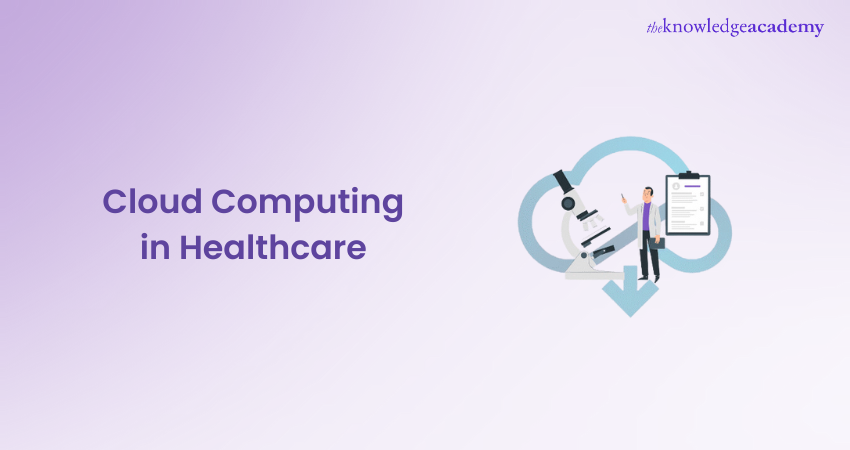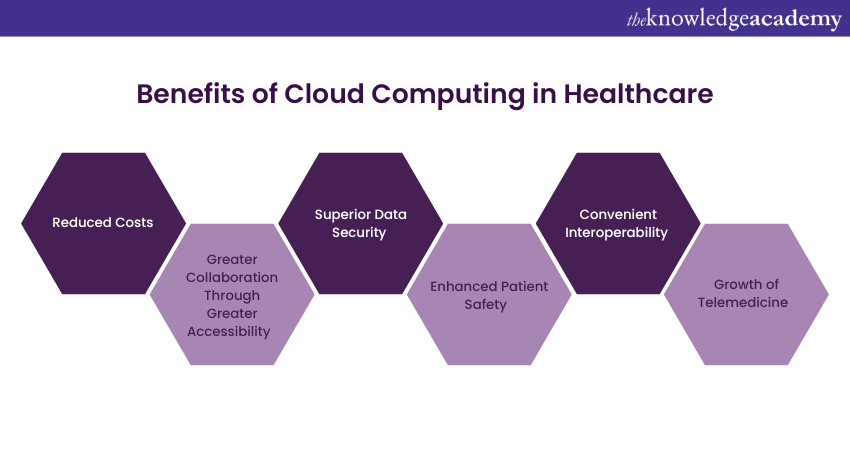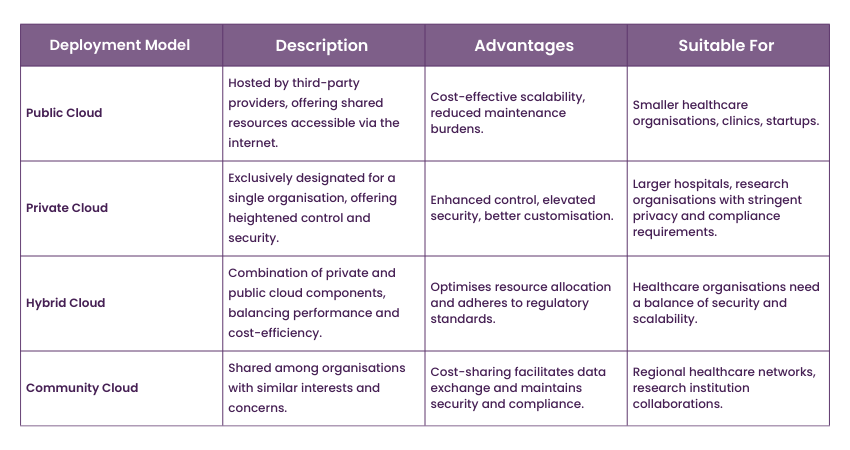We may not have the course you’re looking for. If you enquire or give us a call on + 1-866 272 8822 and speak to our training experts, we may still be able to help with your training requirements.
Training Outcomes Within Your Budget!
We ensure quality, budget-alignment, and timely delivery by our expert instructors.

Have you ever wondered how hospitals manage to keep up with the ever-growing mountain of patient data? The answer lies in Cloud Computing in Healthcare. As this groundbreaking technology takes hold, it’s not just changing how healthcare providers operate—it’s revolutionising the entire industry.
However, with great power comes great responsibility. As we explore the benefits and risks of Cloud Computing in Healthcare, questions arise: How can we ensure data security and patient privacy? Join us to discover how it’s transforming healthcare services, boosting efficiency, and paving the way for a healthier future.
Table of Contents
1) What is Cloud Computing in Healthcare?
2) Benefits of Cloud Computing in Healthcare
3) Applications of Cloud Computing in Healthcare
4) Cloud Service Models in Healthcare
5) Cloud Deployment Models in Healthcare
6) Challenges and Considerations
7) Conclusion
What is Cloud Computing in Healthcare?
Cloud Computing is a transformative technological approach that has significantly impacted various industries, including Healthcare. It involves the delivery of computing resources—such as storage, processing power, and software—over the internet. Instead of relying on local servers or devices, it also allows organisations to access and utilise these resources remotely, providing a dynamic and flexible infrastructure.
Cloud Computing enables healthcare providers to manage and store vast amounts of patient data efficiently. It facilitates real-time collaboration among medical professionals and supports advanced technologies like AI and machine learning for improved diagnostics and personalised care. Cloud Computing thus enhances operational efficiency and patient outcomes in the healthcare sector.
Benefits of Cloud Computing in Healthcare
The following are the Benefits of Cloud Computing in Healthcare:

1) Reduced Costs
a) Lowers expenses associated with maintaining physical data centres
b) Minimises the need for expensive software and hardware updates
c) Minimises operational costs through scalable solutions
d) Eliminates the need for physical storage space
2) Greater Collaboration Through Greater Accessibility
a) Enables real-time data sharing among healthcare professionals
b) Improves coordination and communication across departments and facilities
c) Facilitates remote consultations and virtual teamwork
d) Enhances patient care through shared access to comprehensive medical records
3) Superior Data Security
a) Utilises encryption and security protocols to protect sensitive information
b) Ensures compliance with healthcare regulations and standards
c) Frequent security updates and patches to safeguard against cyber threats
d) Provides disaster recovery solutions to protect data integrity
4) Enhanced Patient Safety
a) Provides quick access to patient records for better decision-making
b) Reduces the risk of medical errors by having accurate and up-to-date information
c) Supports clinical decision support systems for improved treatment plans
d) Enables continuous monitoring and alerts for critical patient conditions
5) Convenient Interoperability
a) Facilitates seamless integration of various healthcare systems and applications
b) Enhances the flow of information between different healthcare providers
c) Standardises data formats for easier data exchange
d) Promotes unified patient records accessible across multiple platforms
6) Growth of Telemedicine
a) Supports remote consultations and telehealth services
b) Expands access to healthcare, especially in rural and underserved areas
c) Reduces the need for patient travel and associated costs
d) Provides continuous patient engagement and follow-up care
Master Terraform with our expert-led Terraform Training. Boost your cloud infrastructure skills and career opportunities!
Applications of Cloud Computing in Healthcare
Cloud Computing's transformative capabilities have found a multitude of applications within the Healthcare sector, revolutionising how medical services are delivered, managed, and improved.
Electronic Health Records (EHRs) and Electronic Medical Records (EMRs)
One of the foremost applications is the storage and management of EHRs and EMRs. Cloud-based systems securely store patient data, ensuring authorised Healthcare providers have instant access to comprehensive medical histories. This accessibility streamlines patient care by allowing quick and accurate decision-making, regardless of the provider's physical location.
Telemedicine and Remote Patient Monitoring
Cloud Computing plays a crucial role in telemedicine, enabling remote consultations between patients and Healthcare professionals. Additionally, it facilitates the remote monitoring of patients' health conditions through wearable devices that transmit real-time data to cloud servers. This capability not only enhances patient convenience but also enables proactive interventions based on accurate, up-to-date information.
Medical Imaging and Diagnostics
The cloud has revolutionised medical imaging by enabling the storage, sharing, and analysis of intricate images such as X-rays, MRIs, and CT scans. Healthcare providers can access these images remotely, enabling faster consultations and expert opinions. Furthermore, cloud-powered diagnostic tools harness the processing power required for complex image analysis, aiding in accurate diagnoses.
Research and Data Analysis
Cloud Computing empowers medical researchers by providing the computational resources necessary for efficiently analysing vast datasets. Researchers can collaborate on projects regardless of their geographical locations, advancing medical discoveries and treatments. The cloud's scalability allows researchers to handle significant data volumes without the need for extensive on-premises infrastructure.
Elevate your tech expertise with our Microservices Architecture Training and master the future of Agile, scalable software development!
Cloud Service Models in Healthcare
Cloud Computing offers different service models that cater to the needs of Healthcare organisations, providing flexibility and scalability while optimising resource utilisation and costs.

Infrastructure as a Service (IaaS)
IaaS forms the fundamental building blocks of computing infrastructure over the cloud. In Healthcare, this translates to the availability of virtualised resources such as servers, storage, and networking. Healthcare institutions can scale their Information Technology (IT) resources up or down as needed, eliminating the need for extensive on-premises hardware. This flexibility is particularly valuable during peak workloads or when launching new applications.
Platform as a Service (PaaS)
PaaS provides a platform to create, launch, and oversee applications, relieving them of concerns about the underlying infrastructure. In Healthcare, this model enables the creation of customised applications that address specific clinical or administrative needs. Developers can focus on functionality rather than infrastructure management, accelerating the deployment of innovative solutions.
Software as a Service (SaaS)
SaaS offers ready-to-use software applications over the cloud. Healthcare institutions can utilise Electronic Health Record (EHR) systems, practice management software, and telehealth platforms without the hassle of local installations and maintenance. SaaS SaaS solutions streamline workflows, enhance collaboration, and provide regular updates, ensuring that healthcare professionals work with updated Cloud Computing Tools.
Comparison and use cases
Choosing the appropriate service model depends on the specific requirements of the Healthcare organisation. Smaller clinics might benefit from SaaS applications due to their ease of use and lower upfront costs. Larger hospitals might opt for IaaS and PaaS solutions to accommodate their complex and varied IT needs, enabling them to tailor applications precisely.
Elevate your skills with our Cloud Computing Training and unlock a world of limitless technological possibilities!
Cloud Deployment Models in Healthcare
Cloud Computing offers various deployment models, each with distinct advantages and considerations, allowing Healthcare institutions to tailor their cloud strategies to their specific requirements and preferences.

Public Cloud
Third-party providers host public clouds, furnishing shared resources accessible via the internet. In Healthcare, this model provides cost-effective scalability and reduces maintenance burdens. Smaller Healthcare organisations, clinics, and startups can leverage public clouds to access advanced technology without hefty upfront investments.
Private Cloud
Private Clouds are exclusively designated for a single organisation, offering heightened control and elevated security measures. This model suits Healthcare institutions with stringent data privacy and compliance requirements, like larger hospitals or research organisations. It offers better customisation and can be located on-site or hosted by a third-party provider.
Hybrid Cloud
Hybrid clouds are the combination of both Private cloud and Public cloud components, allowing Healthcare organisations to balance performance and cost-efficiency. Sensitive patient data can reside in the Private cloud, while less sensitive applications take advantage of the Public cloud's scalability. Hybrid models are suitable for Healthcare institutions that aim to optimise resource allocation while adhering to regulatory standards.
Community Cloud
Community clouds are shared among organisations with similar interests and concerns. In Healthcare, this model can serve regional Healthcare networks or collaborations among research institutions. Shared resources enable cost-sharing and facilitate data exchange while maintaining the required levels of security and compliance.
Elevate your skills with Linux OpenStack Administration Training and master the art of cloud management!
Challenges and Considerations
While Cloud Computing offers immense benefits to Healthcare, it also presents notable challenges and considerations that must be addressed to ensure a smooth and secure implementation.
Integration with Existing Systems
a) Compatibility Issues: Ensuring new cloud systems are compatible with existing healthcare infrastructure can be challenging.
b) Data Synchronisation: Maintaining seamless data flow and synchronisation between cloud and on-premises systems is crucial.
c) Customisation: Existing systems may require significant customisation to integrate smoothly with cloud platforms.
Data Migration and Portability
a) Data Integrity: Maintaining data integrity throughout the process of migration to avoid data loss or corruption.
b) Downtime: Minimising system downtime during data migration to prevent disruption in healthcare services.
c) Cost: Data migration can be costly and resource-intensive, requiring careful planning and execution.
Vendor Lock-In
a) Flexibility: Dependence on a single vendor can reduce flexibility and make it complicate to switch providers if needed.
b) Cost Implications: Vendor lock-in can result in higher long-term costs due to a lack of competitive pricing.
c) Interoperability: Ensuring data and applications can be moved and used across different platforms and vendors without significant rework.
Security and Privacy Concerns
a) Data Breaches: Healthcare data is highly sensitive and a prime target for cybercriminals. Ensuring robust security measures to prevent data breaches is critical.
b) Compliance: Meeting stringent regulatory requirements, such as HIPAA in the US or GDPR in the EU, is essential to protect patient privacy.
c) Data Encryption: Implementing advanced encryption protocols is necessary to safeguard data both in transit and at rest.
Embrace the future of Healthcare with Cloud Computing Training– unlock innovation, efficiency, and patient-centric solutions today!
Conclusion
Cloud Computing in Healthcare industry is a game-changer, revolutionising data management, boosting collaboration, and enabling cutting-edge diagnostics. While its benefits are immense, ensuring data security and patient privacy is paramount. Embrace this innovative technology to unlock a future of smarter, more efficient, and patient-centric healthcare.
Unlock new opportunities with AI for Certified Artificial Intelligence (AI) For Cloud Professionals Training – register now and elevate your career!
Frequently Asked Questions

Yes, cloud databases are widely used in healthcare to store and manage patient records. They support real-time data access, improve collaboration, and enhance data security while reducing infrastructure costs.

Yes, Cloud Computing can significantly aid healthcare research. It provides the computational power needed to analyse large datasets and enables collaboration among researchers worldwide. Additionally, it offers scalable resources without the need for extensive on-premises infrastructure.

The Knowledge Academy takes global learning to new heights, offering over 30,000 online courses across 490+ locations in 220 countries. This expansive reach ensures accessibility and convenience for learners worldwide.
Alongside our diverse Online Course Catalogue, encompassing 17 major categories, we go the extra mile by providing a plethora of free educational Online Resources like News updates, Blogs, videos, webinars, and interview questions. Tailoring learning experiences further, professionals can maximise value with customisable Course Bundles of TKA.

The Knowledge Academy’s Knowledge Pass, a prepaid voucher, adds another layer of flexibility, allowing course bookings over a 12-month period. Join us on a journey where education knows no bounds.

The Knowledge Academy offers various Cloud Computing, including Cloud Computing Training, Linux OpenStack Administration Training, Microservices Architecture Training and Certified Artificial Intelligence (AI) For Cloud Professionals Training. These courses cater to different skill levels, providing comprehensive insights into Cloud Computing Salary.
Our Cloud Computing Blogs cover a range of topics related to Cloud Computing, offering valuable resources, best practices, and industry insights. Whether you are a beginner or looking to advance your Cloud Computing skills, The Knowledge Academy's diverse courses and informative blogs have got you covered.
Upcoming Cloud Computing Resources Batches & Dates
Date
 Cloud Computing Training
Cloud Computing Training
Thu 23rd Jan 2025
Thu 10th Apr 2025
Thu 15th May 2025
Thu 17th Jul 2025
Thu 4th Sep 2025
Thu 13th Nov 2025







 Top Rated Course
Top Rated Course



 If you wish to make any changes to your course, please
If you wish to make any changes to your course, please


